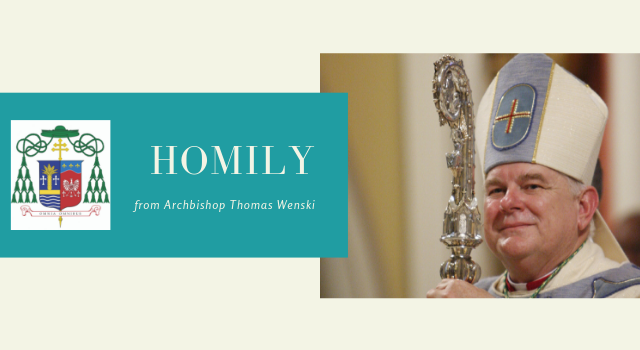By Archbishop Thomas Wenski - The Archdiocese of Miami
Archbishop Thomas Wenski preached this homily during a Mass with members of Legatus, celebrated Jan. 15, 2021 at The Breakers in Palm Beach.
The Gospel today is taken from St. Mark – the scene of this miracle is moving. We see a desperate and helpless paralytic; we see his friends who almost bodysurf through the crowd to get close to Jesus. No social distancing here. The crowd was so thick – they took him to the rooftop and lower him down.
What’s impressive here is not the faith of the paralytic; it’s the faith of his friends. “Seeing their faith, Jesus says to the paralytic your sins are forgiven.” (You know, this scripture passage has long been used to explain why infants can be baptized: the faith of the community – of parents and godparents – supplies for the baby).
But this miracle story sets up the drama that will play out in the Gospel of the battle between good and evil, God and Satan, life and death. And, it also underscores what Jesus was about and who he was – he came to forgive sins; that is, to reconcile fallen humanity to God; and he could do this precisely because he was God. For only God can forgive sins.
And so, in this Gospel passage – in particular – and in the Gospel – in general, we see Jesus doing God’s work. Jesus preaches, he heals, he teaches, and he performs signs of God’s power, the greatest of which would be his passion, death and Resurrection for the life of the world. Jesus’ work was unique – he is the sole Mediator between God and man. His work is not our work; but our work, as God’s people, is to cooperate with God in restoring what was lost by sin by making the world the way God intended from the beginning. For a believer, then, work – even the most mundane task – is participating in God’s plan for the world. Made in the image and likeness of our Creator God, we acknowledge ourselves to be his creatures when we labor in line with his purpose and we establish goals to achieve what is good for ourselves and for others.
As Catholics, your success in business cannot be judged solely on the bottom line – your business performance will be judged on that to be sure; but also, it will be judged on how it has helped you to achieve personal sanctification and how it has helped others achieve this as well. In other words, you should see your business as a “vocation,” a way of responding to your baptismal call to holiness.
The separation of faith from life has always been a temptation from the earliest days of Christianity; but it has become a real problem today. The tenets of our faith seem to have nothing to do with what is taught in MBA curricula. The secularism that is increasingly dominant in our society affects the way we think and act – and the way we do business.
Secularism, as I sometimes tell the kids at their confirmations, is a 50-cent word that means pretending to organize one’s life as if God did not matter. How often have we been tempted to dismiss an ethical concern; how often have we stifled the voice of conscience in making a difficult decision by just saying: business is business? You might work in a board room and not a sacristy; but your work – what you do and how you do it – should witness that God matters.
Too often, preachers often influenced less by St. Mark as they are by Karl Marx, try to make businesspeople in the pew feel guilty for their success. There is nothing wrong in making a profit – in fact, when a firm makes a profit it shows that it has used its resources correctly and human needs have been satisfied.
Nevertheless, profit is not the sole criteria for judging a firm’s condition. It is possible for the accounts to be in order, and at the same time the people who make up the community of workers could be humiliated and offended.
Work brings people together for the service of society. God made us as social beings and work is done within a community of persons. Without a community to support him that paralytic would have remained along the roadside abandoned. Without a community to support him, he would have been – to quote Pope Francis – “disposable.”
The marketplace provides many opportunities to be creative and productive and to create wealth. This is good but there is also an order of importance: Business manuals advise that the best companies are the ones that respect and care for their employees. And certainly, during this pandemic that resolve to respect and care for employees has been sorely tested.
We are social beings – it’s the way that God made us. If our work, and our careers, undermine rather than strengthen the network of relationships that make up our lives, then something is wrong. In other words, if we allow ourselves to live – and to do business – as if God doesn’t matter, then our neighbors won’t matter, our employees and co-workers won’t matter, our families won’t matter, our marriages won’t matter.
As Mark reminds us in his Gospel, we are players in a great drama: The drama reveals to us what Jesus was about and who he was – and, in doing so, the Gospel also invites us to play our roles in a way that shows we know who we are and what we should be about.

